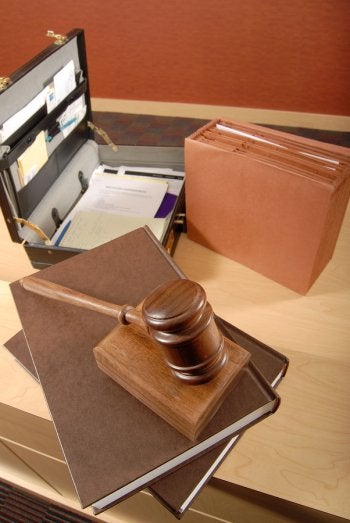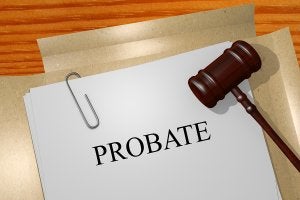-
7 Instances When You Need an Estate Attorney [Infographic]
A proliferation of online legal forms have made many people assume that they can do things like prepare a will without the assistance of an estate planning attorney. However, hiring an estate planning attorney is the only way to ensure that your assets are divided among your heirs as you wish. The complexity of estate law, which varies from state to state, makes boilerplate forms useless, and further, estate planning involves much more than simply writing a will. Learn about different circumstances in which you could benefit from hiring an estate attorney in this infographic from Andrew J. Bolton, Esq. Contact us when you need an estate attorney in Conroe, TX , and help other families avoid estate issues by sharing this information.
![7 Estate Attorney 7 Instances When You Need an Estate Attorney [Infographic]](https://www.boltonlegal.com/wp-content/uploads/2019/10/7-Instances-When-You-Need-an-Estate-Attorney-Infographic-01.jpg)
-
The Types of Decisions Made by Guardians
You may already be familiar with the concept of a legal guardian as it applies to the care of minor children. But did you know that a guardianship can benefit people of all ages? If you take care of an elderly parent or other incapacitated family member, consider talking to a lawyer in Houston about the potential to be legally appointed to make decisions with a guardianship appointment .
There are two primary types of guardianships available. One is over the ward’s estate, and the other is over the ward’s person. A guardianship over an incapacitated person’s “person” allows an individual to make decisions regarding medical care, education, and residency. A guardianship over a person’s estate allows the individual to make financial decisions. These include buying or selling property, paying bills, and allocating money in a way that is in the best interests of the incapacitated person. In some cases, a guardianship is sought because another individual has power of attorney, but is not making decisions that benefit the incapacitated person. A legal guardian’s authority supersedes the authority of the agent with the power of attorney.

-
The Basics of Probate
In a probate court, a decedent’s will is either authenticated or it is declared invalid. The probate process involves the distribution of the estate to the decedent’s beneficiaries and creditors. There is a “pecking order” as to who gets what from the estate. These actions are facilitated by the executor of the will and by a probate lawyer serving The Woodlands. You can learn more about the probate process by watching this brief video.
This legal professional explains that the probate process may sometimes take longer than a few months if the will is contested or there are multiple claims against the estate. Because of the complexities of estate matters, it’s advisable to seek the guidance of a probate lawyer. A probate lawyer’s advice can prove invaluable, especially in cases in which the will is contested.
-
Factors to Consider Before Agreeing to Be an Executor
The executor of an estate is responsible for filing the will in the probate court, notifying beneficiaries, locating and managing assets, and consulting an estate planning attorney in The Woodlands. Being named as the executor of an estate is often seen as an honor because executors must be both trustworthy and honest. Yet, many people agree to the job before they truly understand what it involves. Consider talking to an estate planning attorney before making your decision. If you were named in a will as the executor of an estate without your knowledge, then you should know that you do have the right to decline the role.
Legal Requirements

Consult an attorney to ensure that you meet the legal requirements to serve as an executor. Each state has its own laws, but in general, adults who do not have a felony conviction on their records are eligible to serve. Additional restrictions may also apply to out-of-state executors who wish to probate a will in Texas.
Executor Responsibilities
Serving as an executor can take considerable time and energy, depending on how complex the estate matters are. Executors must be detail-oriented, honest, patient, and well-organized. It’s helpful if executors generally work well with other people and have a basic knowledge of finances. Before you agree to be an executor, consider whether you’re willing and able to carry out the following tasks:
- File the will
- Notify beneficiaries
- Manage assets during probate
- Terminate outstanding contracts
- Notify government agencies and banks of the death
- Establish an estate bank account
- Pay continuing expenses and taxes
- Notify creditors and pay debts
- Distribute the property
- Close the estate
Personal Issues
Even if you’re confident that you can carry out the many responsibilities of being an executor, there may be personal issues that get in the way. For example, you might live far away from the probate court or perhaps far from the primary asset which needs care and oversight. Perhaps you might not have enough time to spare to do the job properly. In cases of co-executors, you might have difficulties working with a co-executor. Or you might have reservations about dealing with particular beneficiaries who might disagree with the will or with your handling of estate matters. On the other hand, if you are the sole beneficiary and you’ve also been named as the executor, then serving in this capacity should be fairly straightforward—especially with the assistance of an estate planning attorney.
-
Comparing Common Law and Community Property States
For many couples, living in either a common law or community property state is only relevant when a divorce is imminent or when one spouse dies. The designation of the state you live in will influence the distribution of property during the divorce. If you are new to Texas, and upon consulting with a family law attorney in Houston, you’ll learn that Texas is a community property state. It’s important to bring documents pertaining to your assets to your consultation with the family law attorney in order to learn how your property might be divided by the court.
Common Law Property Rules

Common law property rules are applicable in most states. Typically, this means that when one spouse acquires property during the marriage, that property is only owned by that spouse. If both spouses purchase property such as a house or vehicle, then each spouse owns 50% of that property. Common law property rules also apply to property that is received as a gift. When one of the spouses dies, his or her separately owned property is distributed in accordance with the will or the rules of intestate succession. Jointly owned property may become the sole property of the surviving spouse or half of the ownership may be distributed to someone else, depending on how ownership was shared by the spouses. For example, owning property via “joint tenancy with the right of survivorship” would pass full ownership of the property to the surviving spouse. If the property is owned via “tenancy in common,” then the property may be distributed to another beneficiary.
Community Property
On the other hand, the rules of community property can be quite complex, and this is one reason why it’s advisable to consult a family law attorney. In community property states, all property acquired during the course of the marriage is considered to be marital or community property, which involves shared, 50/50 ownership (unless you can prove otherwise). Your family law attorney will need to know when various assets were acquired to determine whether they are solely or jointly owned with any third party. In contrast to property acquired during the marriage, assets purchased and wages earned prior to the marriage belong solely to one spouse who acquired the wages or earnings. Interestingly, earnings and assets acquired after the physical separation of the spouses are not solely owned but still may be considered community property. Community property law also applies to debts.
-
Should You Talk to Your Heirs About Your Will?
After visiting a will attorney in The Woodlands, you might consider discussing your estate plan with your family members or other beneficiaries. You do not have an obligation to divulge the details of your will, but there are many good reasons to consider doing so. For example, letting your beneficiaries know what they can expect to inherit may reduce the risk of a contested will .

Promoting Family Harmony
When one or more family members decide to challenge a will, financial gain is not the only issue at stake. A will contest can instigate hostilities among family members that can last for years and may even lead to permanent estrangements. It is not likely that this is the sort of legacy you wish to leave behind. Of course, deciding not to speak with your heirs about your will while you are still alive will not automatically result in family conflict. However, many individuals wish to avoid the possibility altogether by simply having a frank discussion with their heirs.
Explaining Your Decisions
Discussing your will with your heirs can grant peace of mind to everyone involved. You’ll have the opportunity to explain why you decided to leave the house to one sibling and the collection of heirloom jewelry to another. Decisions which may seem obvious to you might not necessarily be easily understood by your heirs. For example, it may make sense to you to leave the vacation home to the heir who used it the most and to compensate for this by leaving a larger sum of money to another heir. But since your heirs might not easily discern your reasoning after you’re gone, it may be wise to give them an explanation now.
Adjusting the Inheritances
Because estate planning is a sensitive issue and many individuals hesitate to disclose the details of their wills to their heirs because they fear being pressured to change their decisions. The provisions that compose your will are entirely yours to make; no one should pressure you to change your mind. Yet, it isn’t unreasonable to listen to the responses of your heirs and consider making adjustments should they make sense to you. For example, you might have your heart set on leaving your amber jewelry to your daughter, but perhaps she doesn’t wear jewelry and would rather you left it to someone who would appreciate it more.
-
Authenticating a Will Through Probate
When an executor probates a will in Houston, part of the probate process involves the authentication of the will. In many cases, the will is authenticated without a problem. Occasionally, a party in interest will challenge a will. The act of contesting a will means that one or more individuals have reason to believe that the will is invalid. Where such contested probate litigation is successful, the result may be a change in the distribution of the decedent’s estate.

Many people choose to create numerous wills throughout their lifetime to reflect their changing life circumstances. In most cases, the most recently drafted will is considered to be the Decedent’s true last will and testament. If the most recent will fails to comport with the requirements for a valid will, then the executor may have to revert to the second most recent will. A will may fail to be authenticated, or admitted to probate, because it was not created in a legally acceptable form; it was not witnessed properly; or the decedent did not have the mental capacity to understand the provisions of the will at the time of its creation.
-
Reasons Your Attorney May Suggest a Probate Bond
A probate bond is much like an insurance policy that protects the beneficiaries of an estate from acts of wrongdoing. If an estate or an executor is required to obtain a probate bond in The Woodlands, the issuer of the bond agrees to compensate the beneficiaries if a financial loss results from errors committed by the executor. The process of obtaining a probate bond can be complicated, but there are several reasons why your probate lawyer may recommend that you obtain one.

You would like to give your beneficiaries peace of mind
The process of obtaining a probate bond can be long and arduous, and the premiums can be prohibitively expensive. For these reasons, many testators choose to waive the bond requirement. But in some cases, requiring a probate bond is a wise move because it can grant peace of mind to your beneficiaries as well as to the executor over the estate. With a probate bond, heirs can rest assured that they will receive the assets to which they are entitled under the terms of your will. You may also enjoy peace of mind knowing that your heirs will be properly taken care of after you have passed on.
Your chosen executor is also an heir
A conflict of interest can arise when a designated executor is expected to receive an inheritance. Even if you trust your executor to faithfully carry out the duties required of him or her, the other beneficiaries may not necessarily be quite as trusting. Oftentimes, requiring a probate bond can help preserve harmony within the family.
The estate holds substantial assets
Probate courts are more likely to require that a bond be obtained if the estate holds significant assets. When greater financial gain is at stake, the possibility of fraudulent activity tends to increase. Additionally, a significant estate may lend itself to a greater chance of making unintentional errors that may cost your beneficiaries part of their inheritance.
You expect to leave unsecured debts behind
Unsecured debts are those that are not attached to collateral. These include credit card bills or medical debts. If there is a possibility that you will leave substantial unsecured debts when you pass on, requiring a probate bond can be a smart decision.
-
Selecting Your Executor
The executor of a will has many responsibilities. When it’s time to choose your executor , consider speaking with a probate lawyer in The Woodlands for guidance. Your probate lawyer may recommend choosing a professional executor if the estate is large, or if you’re concerned that your loved ones may not be suitable for this role. If you would prefer to select a known executor of your will, please watch this video for some helpful tips.
This probate professional recommends making a list of people whom you trust to carry out your final wishes and manage your legacy. Then, narrow down your choices by considering which individuals are best able to manage official paperwork and pay attention to details. Before designating your executor, ask that individual if he or she is willing to carry out these important duties.
-
What Happens to Stocks When the Owner Is Deceased?
It is likely that the stocks of a deceased owner will have to go through the probate process, but it’s best to consult a probate lawyer in Houston to confirm this. If stocks are jointly owned or titled “transfer on death,” then the designated survivor can simply redeem the stocks without the need for formal probate. Otherwise, the executor of the will must file the will with the court and then receive court-issued letters testamentary to validate his or her authority to transfer ownership of stock shares.
Oftentimes, the executor of the will then set up a separate estate account and re-register the stocks in the name of the estate itself, rather than the decedent. If the will specifies that the stocks are to go to one or more specific beneficiaries, the stocks can usually be transferred to those individuals unless the assets must otherwise be used to satisfy the liabilities of the estate. In some cases, the executor may need to obtain a court order to use the stocks in this manner. Otherwise, the stocks can simply be liquidated and the funds deposited into the estate account.

RECENT POSTS
categories
- Uncategorized
- Estate Planning
- Probate
- Family Law
- Drafting a Will
- Divorce Lawyer
- Texas Family Law
- Divorce
- Real Estate
- Probate Court
- Child Custody
- Andrew J. Bolton
- Esq.
- Adoption
- Law Office of Andrew J. Bolton
- Wills
- Executor
- Infographic
- Guardianship
- Trusts
- Contested Divorce
- Child Support
- Attorney
- Living Wills
- Contested Will
- Prenuptial
- Probate Bond
- Heir Apparent
- Legacy Contact
- Living Trusts
- legal guardian
- Legal Disputes
- property rules
- Common Law
- Stocks
- Estate Tax
